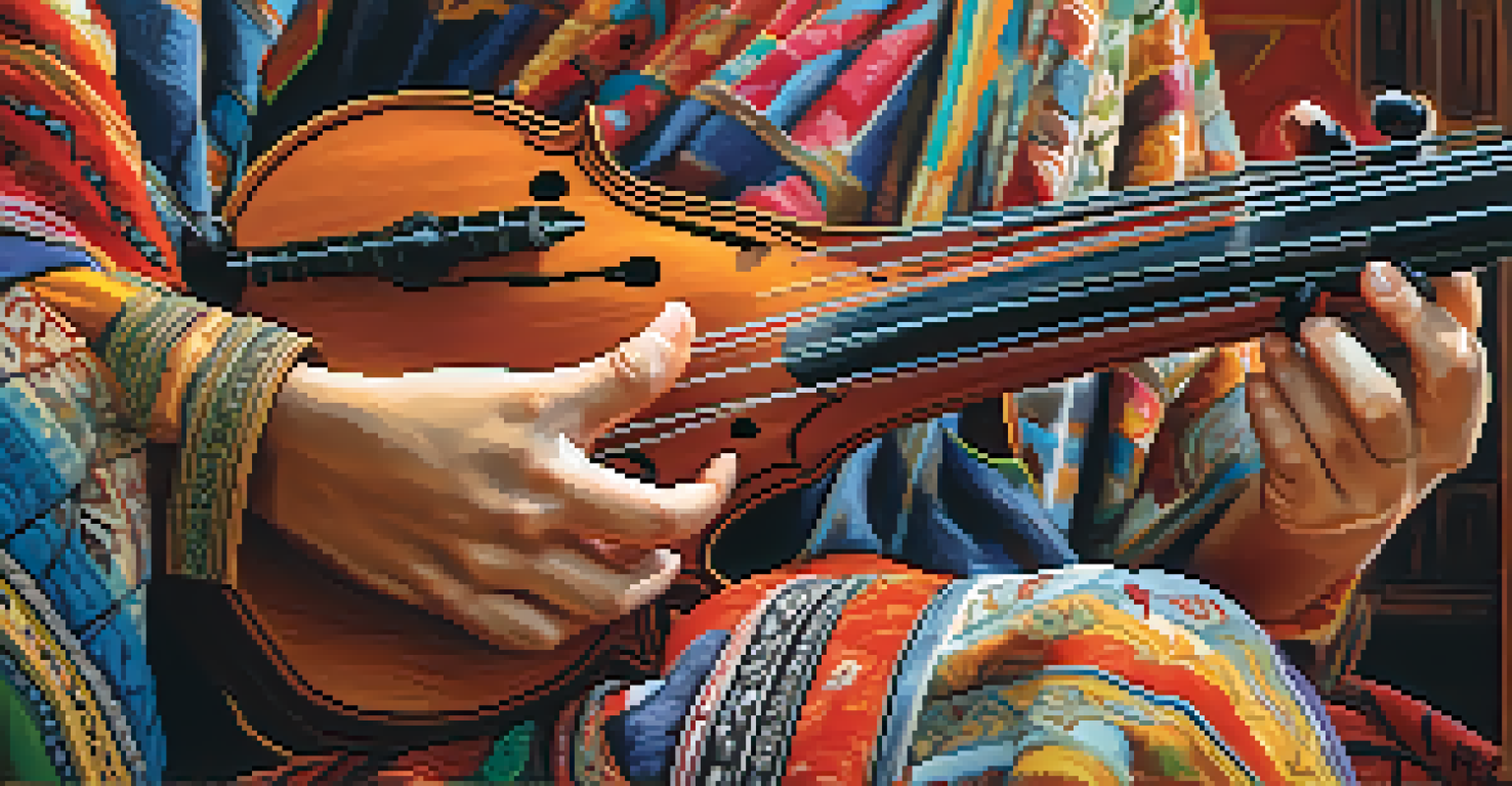Cultural Perspectives: Music's Role in Mental Health Across Cultures

Understanding Music as a Universal Language
Music transcends geographical boundaries and cultural differences, making it a universal form of expression. It has the power to convey emotions and experiences that words sometimes cannot capture. This shared connection through music can foster a sense of belonging, which is essential for mental well-being.
Music can change the world because it can change people.
Across cultures, music serves as a communal activity, bringing people together during celebrations, rituals, and even times of mourning. For instance, in many African communities, drumming and singing are integral to social gatherings and healing ceremonies. This collective experience can alleviate feelings of isolation and promote emotional resilience.
By recognizing music's universal appeal, we can appreciate its role in mental health, not just as a source of entertainment, but as a vital tool for emotional expression and community bonding.
Traditional Healing and Music Therapy Practices
Many cultures have long embraced music as a therapeutic tool, incorporating it into their healing practices. In Indigenous cultures, for example, songs and chants are often used in rituals to promote mental and spiritual healing. These practices highlight the deep-rooted belief that music can facilitate emotional release and recovery.

Similarly, in Indian classical music, ragas are believed to evoke specific emotions and states of mind. This connection between sound and emotion is harnessed in music therapy, which has gained recognition in Western medicine as an effective treatment for various mental health issues.
Music as a Healing Tool
Music serves as a universal language that promotes emotional expression and community bonding, significantly impacting mental health.
As we explore these traditional practices, we see that music is not just a backdrop for life; it plays a vital role in shaping mental health and well-being across different societies.
The Role of Music in Everyday Life and Mental Health
In our daily lives, music often serves as a soundtrack to our experiences, influencing our mood and mental state. Many people turn to music during times of stress or sadness, finding solace in their favorite songs. This instinctive use of music as a coping mechanism underscores its significance in mental health.
Where words fail, music speaks.
Different cultures have unique musical traditions that reflect their values and lifestyle, which can also impact mental health. For instance, the upbeat rhythms of Caribbean music promote a sense of joy and celebration, while the reflective tones of folk music can encourage introspection and emotional healing.
Understanding how music intertwines with our daily lives allows us to harness its therapeutic potential, ultimately enhancing our mental health and emotional well-being.
Cultural Variations in Music Preferences and Mental Health
Cultural backgrounds influence not only the music people enjoy but also how they perceive its impact on mental health. For instance, Western pop music often emphasizes individualism and personal struggles, resonating with listeners who seek validation for their feelings. In contrast, traditional folk music in many cultures often highlights community experiences, fostering a sense of collective healing.
Research shows that people from different cultural backgrounds may respond differently to various types of music when addressing mental health issues. For example, while some may find comfort in the emotional lyrics of ballads, others might prefer the uplifting beats of dance music to boost their mood.
Cultural Influences on Music and Health
Cultural backgrounds shape music preferences and perceptions, highlighting the need for personalized approaches in music therapy.
These cultural variations remind us that a one-size-fits-all approach to music and mental health may not be effective, and personalized strategies should be considered.
Music and Its Role in Youth Mental Health Across Cultures
For young people, music often serves as a vital outlet for expressing emotions and navigating mental health challenges. In many cultures, youth connect with music as a form of rebellion or self-exploration, using lyrics and melodies to articulate their feelings. This connection can be crucial in reducing feelings of loneliness and anxiety.
Global youth movements, such as K-pop in South Korea or rap in the United States, showcase how music can unite young people around shared experiences, fostering community and support. These movements often address themes of mental health, resilience, and identity, resonating deeply with their audiences.
By providing a platform for expression and connection, music plays an essential role in supporting the mental health of young people across diverse cultures.
The Impact of Modern Technology on Music and Mental Health
The rise of technology has transformed how we consume and interact with music, making it more accessible than ever before. Streaming platforms allow individuals from different cultures to discover and enjoy a wide variety of musical genres, broadening their horizons and enriching their mental health experiences. This accessibility can help foster understanding and appreciation for different cultural perspectives.
However, the digital age also presents challenges, such as the pressure to conform to trends or the impact of social media on mental health. For example, the constant barrage of curated content can lead to feelings of inadequacy or anxiety, which may override the positive effects of music.
Technology's Dual Role in Music
While technology enhances access to diverse music, it also presents challenges that can affect mental health, requiring a balanced approach.
As we navigate this digital landscape, it's crucial to find a balance, ensuring that technology enhances our relationship with music rather than detracting from its mental health benefits.
Conclusion: Embracing Music for Mental Health Across Cultures
In conclusion, music's role in mental health is a rich and complex tapestry woven from diverse cultural threads. By understanding and embracing these cultural perspectives, we can unlock the full potential of music as a tool for healing and well-being. It's essential to recognize that while music can be a powerful ally in promoting mental health, its effectiveness may vary based on individual and cultural contexts.
Encouraging open conversations about the relationship between music and mental health can help destigmatize mental health issues and promote healing. By sharing stories and experiences, we can build a supportive community that values the unique contributions of music across cultures.

Ultimately, by celebrating the diverse ways music influences mental health, we can foster a more inclusive and understanding world, where everyone feels empowered to use music as a source of solace and strength.